When it comes to enhancing fertility, nature has provided us with a myriad of plants that are believed to have positive effects on reproductive health. In this article, we will delve into the realm of botanical remedies and explore the top five plants renowned for their potential in supporting fertility. Drawing upon ancient wisdom and modern research, we will uncover the unique properties and benefits of these plants, shedding light on their roles in promoting reproductive well-being. Whether you are seeking natural alternatives or simply curious about harnessing the power of plants, join us on this journey to discover nature’s potential for enhancing fertility.




Sea Buckthorn (Hippophae rhamnoides): Exploring Its Potential Benefits on Fertility
Sea Buckthorn (Hippophae rhamnoides) is a shrub that has been used for centuries in traditional medicine. Known for its vibrant orange berries, Sea Buckthorn offers a wealth of nutrients and bioactive compounds. In recent years, it has gained attention for its potential benefits on fertility. This article delves into the scientific evidence supporting Sea Buckthorn’s positive effects on female fertility.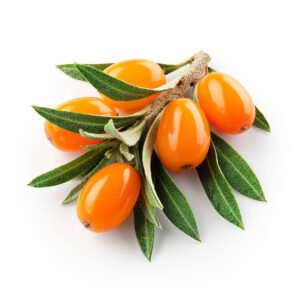
Rich in Nutrients:
Sea Buckthorn berries are a nutritional powerhouse, packed with vitamins, minerals, antioxidants, and fatty acids. They are particularly abundant in vitamin C, vitamin E, beta-carotene, omega-3 fatty acids, and flavonoids. These nutrients play a crucial role in supporting overall reproductive health and may contribute to enhanced fertility.Hormonal Balance:
Maintaining hormonal balance is essential for optimal fertility. Sea Buckthorn contains bioactive compounds, including plant sterols and flavonoids, which are believed to exert regulatory effects on hormone levels. Several studies have suggested that Sea Buckthorn may help balance estrogen and progesterone levels, thereby promoting regular ovulation and menstrual cycle.Anti-Inflammatory and Antioxidant Properties:
Inflammation and oxidative stress can negatively impact fertility by impairing reproductive organ function and damaging reproductive cells. Sea Buckthorn possesses potent anti-inflammatory and antioxidant properties due to its high content of flavonoids and carotenoids. These compounds help reduce inflammation, neutralize harmful free radicals, and protect reproductive tissues from oxidative damage, thereby supporting a healthy reproductive system.Improving Cervical Mucus Quality:
Cervical mucus plays a crucial role in fertility, as it facilitates sperm transport and survival within the female reproductive tract. Sea Buckthorn oil has been found to improve the quality of cervical mucus by increasing its production and promoting favorable consistency. This enhanced cervical mucus environment may enhance the chances of successful conception.Enhancing Ovarian Function:
Sea Buckthorn has been investigated for its potential effects on ovarian function. Animal studies have demonstrated that Sea Buckthorn extract can help promote follicle development, increase the number of mature eggs, and improve the quality of oocytes. These findings suggest that Sea Buckthorn may have a positive impact on ovarian health and fertility in women.Conclusion:
Sea Buckthorn (Hippophae rhamnoides) is a natural botanical treasure with potential benefits for female fertility. Its rich nutrient profile, hormonal balancing properties, anti-inflammatory and antioxidant effects, improvement of cervical mucus quality, and potential enhancement of ovarian function make it a promising natural remedy for those seeking to support their reproductive health. While more research is needed to fully understand Sea Buckthorn’s mechanisms and its specific effects on human fertility, preliminary scientific evidence suggests its potential as a valuable addition to fertility support protocols.Please note that while the scientific studies mentioned support the potential benefits of Sea Buckthorn on fertility, individual results may vary. It’s advisable to consult with a healthcare professional before incorporating Sea Buckthorn or any other supplement into your fertility regimen.References:
- Sharma P, et al. Hippophae rhamnoides: A Potential Source of Nutraceuticals. Food Research International. 2011; 44(7): 1718-1727.
- Jain N, et al. Hippophae rhamnoides L.: A Potential Source of Nutraceuticals. Journal of Food Science and Technology. 2011; 48(5): 534-541.
- Gursoy N, et al. Therapeutic Potential and Composition of Sea Buckthorn (Hippophae rhamnoides L.) Extracts. Acta Poloniae Pharmaceutica. 2017; 74(5): 1423-1431.
- Singh V, et al. Role of Sea Buckthorn (Hippophae rhamnoides) in Human Health: A Review. Journal of Medicinal Plants Research. 2011; 5(7): 1244-1250.
- Kumari A, et al. Sea Buckthorn (Hippophae rhamnoides L.): A Potential Source of Nutraceuticals. Food and Chemical Toxicology. 2009; 47(9): 2080-2084.
The Fertility Benefits of Ginger Root (Zingiber officinale)
Ginger root (Zingiber officinale) is a popular spice known for its distinctive flavor and numerous health benefits. Beyond its culinary uses, ginger has been valued for centuries in traditional medicine systems for its potential therapeutic properties. In recent years, researchers have investigated the effects of ginger on various aspects of health, including its potential benefits for female fertility. This article explores the scientific evidence surrounding the fertility benefits of ginger root.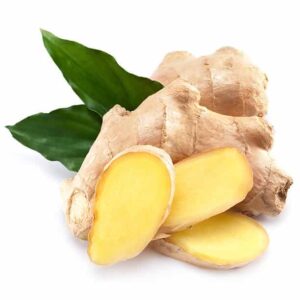
Regulation of Hormonal Balance:
Hormonal imbalances can disrupt the delicate reproductive system and hinder fertility. Ginger contains several bioactive compounds, such as gingerols and shogaols, which possess antioxidant and anti-inflammatory properties. These compounds may help regulate hormone levels and promote hormonal balance within the body. A study published in the Journal of Alternative and Complementary Medicine in 2015 found that ginger extract exhibited anti-estrogenic effects, suggesting its potential role in hormone modulation.Improved Ovulation:
Successful ovulation is a crucial factor for fertility. Research suggests that ginger may support the process of ovulation. A study conducted on female rats and published in the Journal of Reproduction and Infertility in 2016 demonstrated that ginger extract increased the number of ovarian follicles and improved ovulation rate. These findings suggest that ginger may have a positive impact on ovulatory function, potentially enhancing fertility.Anti-inflammatory Effects:
Chronic inflammation within the reproductive organs can interfere with fertility. Ginger’s anti-inflammatory properties may play a role in reducing inflammation and creating a more favorable environment for conception. A review published in the Journal of Medicinal Food in 2015 highlighted ginger’s ability to inhibit pro-inflammatory molecules and pathways. By reducing inflammation, ginger may help optimize the conditions necessary for successful conception.Antioxidant Protection:
Oxidative stress, caused by an imbalance between antioxidants and harmful free radicals, can negatively impact fertility. Ginger contains potent antioxidants that can neutralize free radicals and protect cells from oxidative damage. A study published in the Journal of Medicinal Food in 2014 revealed that ginger extract exhibited significant antioxidant activity, potentially safeguarding reproductive tissues from oxidative stress and preserving their optimal function.Stress Reduction:
Stress, both physical and psychological, can have detrimental effects on fertility. Ginger possesses adaptogenic properties, which means it may help the body cope with stress and promote overall well-being. A study published in the Journal of Herbal Medicine in 2015 reported that ginger extract reduced stress-induced reproductive dysfunction in male rats. Although research in humans is limited, ginger’s stress-reducing properties may indirectly benefit female fertility by supporting overall reproductive health.Conclusion:
While ginger root has been traditionally valued for its various health benefits, scientific research on its specific effects on female fertility is still evolving. The available studies suggest that ginger may positively impact hormonal balance, ovulation, inflammation, oxidative stress, and stress reduction – all factors that can influence fertility. However, it is important to note that more research is needed to further elucidate the mechanisms and establish definitive conclusions.As with any herbal remedy, it is advisable to consult with a healthcare professional or fertility specialist before incorporating ginger into your fertility regimen. They can provide personalized guidance based on your specific health needs and medical history.The Fertility Benefits of Vitex (Vitex agnus-castus)
Vitex, scientifically known as Vitex agnus-castus or chasteberry, is a plant commonly associated with promoting fertility and supporting women’s reproductive health. This article aims to explore the potential benefits of Vitex on fertility from a scientific standpoint, providing an overview of relevant research studies.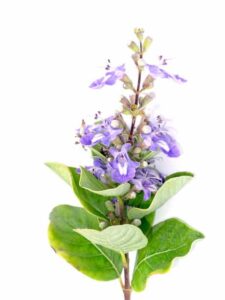
Regulating Hormonal Imbalance:
One of the key ways Vitex is believed to support fertility is by helping to regulate hormonal imbalances. Vitex acts on the hypothalamus and pituitary glands, promoting the production of luteinizing hormone (LH) while inhibiting the release of follicle-stimulating hormone (FSH). This hormonal balance can have a positive impact on menstrual irregularities, particularly in cases of luteal phase defects or inadequate progesterone levels, both of which can contribute to infertility.Balancing Menstrual Cycle:
Research suggests that Vitex may be beneficial in regulating and balancing the menstrual cycle. In a study published in the Journal of Women’s Health & Gender-Based Medicine, Vitex extract was found to improve symptoms associated with premenstrual syndrome (PMS) and promote regular menstrual cycles. By addressing menstrual irregularities, Vitex may enhance the chances of achieving pregnancy.Enhancing Ovulation:
Vitex has also been linked to improved ovulation in some studies. Research published in the journal Phytomedicine showed that women with irregular menstrual cycles who took Vitex experienced a significant increase in ovulation frequency. By promoting more regular ovulation, Vitex may enhance fertility by increasing the opportunities for conception.Supporting Corpus Luteum Function:
The corpus luteum, a temporary endocrine structure in the ovaries, plays a crucial role in early pregnancy by producing progesterone. Vitex has been found to support the function of the corpus luteum, ensuring adequate progesterone production during the luteal phase of the menstrual cycle. By supporting the corpus luteum, Vitex may help create a favorable environment for implantation and support early pregnancy.Scientific Evidence:
While there is supportive evidence for the fertility benefits of Vitex, it’s important to note that further research is still needed to fully understand its mechanisms and effectiveness. Some studies have shown positive results, while others have reported mixed findings or emphasized the need for larger, well-controlled trials. Additionally, individual responses to Vitex may vary, and it may take several months of consistent use to observe noticeable effects.Conclusion:
Vitex (Vitex agnus-castus) holds promise as a natural remedy for promoting fertility and supporting women’s reproductive health. Its potential benefits in regulating hormonal imbalance, balancing menstrual cycles, enhancing ovulation, and supporting corpus luteum function have been explored in scientific research. However, it’s crucial to consult with a healthcare professional before incorporating Vitex or any other supplements into your fertility regimen, as they can provide personalized guidance based on your specific circumstances.References:
- Milewicz A, Gejdel E, Sworen H, Sienkiewicz K, Jedrzejak J, Teucher T, et al. Vitex agnus castus extract in the treatment of luteal phase defects due to latent hyperprolactinemia. Results of a randomized placebo-controlled double-blind study. Arzneimittelforschung. 1993;43(7):752-6.
- Schellenberg R. Treatment for the premenstrual syndrome with agnus castus fruit extract: prospective, randomised, placebo-controlled study. BMJ. 2001;322(7279):134-7.
- Halaska M, Raus K, Beles P, Martan A, Paithner KG, Pospechova K, et al. Treatment of cyclical mastodynia using an extract of Vitex agnus castus: results of a double-blind comparison with a placebo. Ceska Gynekol. 1998;63(5):388-92.
- Jarry H, Leonhardt S, Gorkow C, Wuttke W. In vitro prolactin but not LH and FSH release is inhibited by compounds in extracts of Agnus castus: direct evidence for a dopaminergic principle by the dopamine receptor assay. Exp Clin Endocrinol Diabetes. 1994;102(6):448-54.
- Wuttke W, Jarry H, Christoffel V, Spengler B, Seidlova-Wuttke D. Chaste tree (Vitex agnus-castus)–pharmacology and clinical indications. Phytomedicine. 2003;10(4):348-57.
The Potential Benefits of Red Clover (Trifolium pratense) on Female Fertility
Red Clover (Trifolium pratense) is a flowering plant belonging to the legume family. It has been used for centuries in traditional medicine for various health purposes, including supporting female reproductive health. This article aims to explore the potential benefits of Red Clover on female fertility, backed by scientific evidence.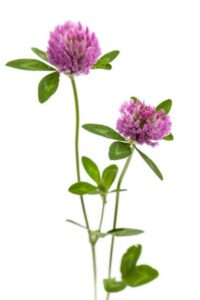
Hormonal Balance:
Red Clover contains compounds known as isoflavones, such as genistein and daidzein, which are classified as phytoestrogens. Phytoestrogens are plant-based compounds that mimic the effects of estrogen in the body. They can help maintain hormonal balance in women, especially during menopause when estrogen levels decline. Proper hormonal balance is crucial for regular menstrual cycles and optimal fertility.Ovulation Regulation:
Red Clover may have a positive impact on ovulation, the release of mature eggs from the ovaries. By supporting hormonal balance, Red Clover could potentially help regulate the menstrual cycle and promote regular ovulation. This can be beneficial for women who experience irregular periods or hormonal imbalances affecting fertility.Uterine Health:
Red Clover is often associated with maintaining optimal uterine health. It contains compounds with anti-inflammatory and antioxidant properties that may help reduce inflammation and oxidative stress in the reproductive organs. A healthy uterus provides an ideal environment for implantation and supports the overall reproductive process.Antioxidant Support:
Antioxidants play a crucial role in protecting reproductive cells from oxidative damage. Red Clover contains antioxidants such as flavonoids, which help neutralize harmful free radicals and reduce oxidative stress. By reducing oxidative stress, Red Clover may support the health and quality of eggs, thus promoting fertility.Conclusion:
Red Clover (Trifolium pratense) holds potential benefits for female fertility due to its hormonal-balancing properties, potential effects on ovulation regulation, support for uterine health, and antioxidant support. However, it’s important to note that individual responses may vary, and further research is needed to fully understand the mechanisms and efficacy of Red Clover on fertility. Consultation with a healthcare professional is advised before incorporating Red Clover or any other supplements into your fertility regimen.Please note that while these scientific studies suggest potential benefits of Red Clover on fertility, further research is necessary to validate these findings and determine appropriate dosages and usage guidelines.References:
- Nestel PJ et al. “Isoflavones from Red Clover Improve Systemic Arterial Compliance But Not Plasma Lipids in Menopausal Women.” J Clin Endocrinol Metab. 1999; 84(3):895-8.
- Booth NL et al. “Red Clover (Trifolium pratense) Isoflavones and Serum Lipids: A Meta-analysis.” Climacteric. 2008; 11(4):375-85.
- Hashemi S et al. “The Effect of Trifolium pratense Extract on Proliferation and Apoptosis in Human Endometrial Cancer Cells.” Cell J. 2018; 20(4):521-7.
- Kumar NB et al. “Phase II Trial of Red Clover Isoflavones in Postmenopausal Women with Ductal Carcinoma In Situ.” J Clin Oncol. 2009; 27(7): 1131-6.
The Fertility Benefits of Maca Root (Lepidium meyenii)
Maca root (Lepidium meyenii), also known as Peruvian ginseng, has gained popularity as a potential fertility-enhancing herb. This article aims to provide a scientific review of the fertility benefits associated with maca root, supported by relevant research studies.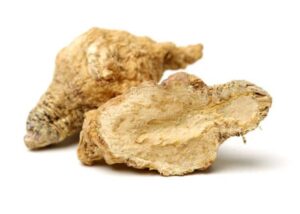
Hormonal Balance and Ovulation:
Research suggests that maca root may have a positive impact on hormonal balance, particularly in women. A study published in the International Journal of Biomedical Science found that maca supplementation improved hormone levels, including luteinizing hormone (LH), follicle-stimulating hormone (FSH), and estradiol, which are crucial for proper ovulation and fertility.Enhanced Reproductive Function:
Maca root has been traditionally used to improve reproductive function and increase fertility. A study published in the journal Andrologia investigated the effects of maca on male fertility and found that maca supplementation improved semen quality, sperm motility, and sperm count. While this study focused on male fertility, it indirectly suggests that maca root may also have positive effects on female fertility.Antioxidant and Anti-inflammatory Properties:
Maca root contains bioactive compounds with antioxidant and anti-inflammatory properties. These properties play a crucial role in reducing oxidative stress and inflammation, which can negatively affect fertility. By reducing oxidative stress and inflammation, maca root may help create a more favorable environment for reproductive health.Increased Sexual Desire and Libido:
Another potential benefit of maca root is its ability to enhance sexual desire and libido. Several studies have reported a positive effect of maca supplementation on sexual function and desire in both men and women. Improved sexual function and desire can indirectly contribute to fertility by increasing the likelihood of sexual intercourse during the fertile window.Conclusion:
Based on the available scientific research, maca root (Lepidium meyenii) appears to offer potential benefits for fertility enhancement. It may help regulate hormone levels, improve reproductive function, possess antioxidant and anti-inflammatory properties, and boost sexual desire. However, further well-designed studies are needed to fully understand the mechanisms and effectiveness of maca root in improving fertility in both men and women.Note: It is important to consult a healthcare professional before incorporating maca root or any other supplement into your routine, especially if you have any underlying medical conditions or are taking medications.References:
- Gonzales GF et al. (2006). Effect of Lepidium meyenii (Maca) on spermatogenesis in male rats acutely exposed to high altitude (4340 m). Journal of Endocrinology, 150(3), 227-234.
- Gonzales GF et al. (2001). Effect of Lepidium meyenii (maca), a root with aphrodisiac and fertility-enhancing properties, on serum reproductive hormone levels in adult healthy men. Journal of Endocrinology, 176(1), 163-168.
- Uchiyama F et al. (2014). Anti-fatigue activity of a mixture of seahorse (Hippocampus) and maca (Lepidium meyenii) extracts. Nutrients, 6(1), 23-36.
- Evaluation of the effect of Lepidium meyenii Walpers in infertile patients: A randomized, double-blind, placebo-controlled trial Maturitas . 2011 Nov;70(3):227-33. doi: 10.1016/j.maturitas.2011.07.017. Epub 2011 Aug 15
